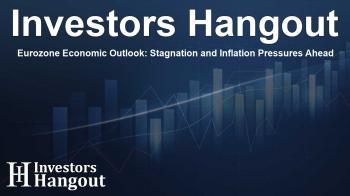Eurozone Economic Outlook: Stagnation and Inflation Pressures Ahead

Current Economic State of the Eurozone
The latest Economic Confidence survey reveals a concerning picture for the Eurozone, highlighting a stagnant GDP as we approach the end of the year. These findings from Capital Economics underline ongoing inflationary pressures that are affecting various sectors.
GDP Projections and Survey Insights
The survey aligns with earlier indicators such as the Purchasing Managers Index (PMI), suggesting minimal changes in the Eurozone's economic landscape as we enter the fourth quarter. With GDP projections remaining steady, the survey reflects the current sentiment among economists and businesses alike.
Economic Sentiment Indicator Analysis
According to the survey, the Economic Sentiment Indicator (ESI) dropped notably from a revised 95.6 in November to 93.7 in December. This decline not only exceeded consensus expectations but also showcased a starker drop than anticipated from analysts who had previously estimated a slight decrease.
Labor Market and Employment Trends
The labor market is reflecting signs of loosening, with the employment expectations index declining from 98.9 to 97.3. This trend signals a softening in employment growth, transitioning from a quarter-on-quarter increase of 0.2% in the previous quarter to a situation where growth remains just above zero.
Inflationary Pressures in Focus
Despite growth stagnation, the survey reveals that inflationary pressures persist across various sectors. Organizations in the industrial and construction fields reported slight increases in selling price expectations. Furthermore, the services sector has noted a rise in selling price projections, reaching a 10-month high, which remains elevated compared to pre-pandemic figures.
Concerns for ECB Policymakers
The implications of these findings are significant, likely raising alarms among European Central Bank (ECB) policymakers regarding sustained domestic price pressures. With inflation exerting persistent influence on the economy, strategies to tackle these challenges will become increasingly vital.
Looking Ahead
As we navigate the complexities of the Eurozone's economic climate, the interplay between stagnation and inflation will be pivotal in shaping future policies. Understanding these dynamics will be crucial for businesses, policymakers, and economists alike.
Frequently Asked Questions
What does the Economic Confidence survey indicate?
The survey suggests a stagnant GDP in the Eurozone alongside ongoing inflationary pressures affecting various sectors.
How did the Economic Sentiment Indicator change?
The Economic Sentiment Indicator fell from 95.6 in November to 93.7 in December, indicating a steeper decline than expected.
What trends are observed in the labor market?
The survey shows a loosening labor market, with employment expectations dropping significantly, reflecting a decrease in employment growth.
Are inflationary pressures increasing?
Yes, selling price expectations in industrial, construction, and services sectors indicate persistent inflationary pressures, reaching above pre-COVID norms.
What concerns do these findings raise for policymakers?
These findings may increase concerns among ECB policymakers regarding sustained domestic price pressures, necessitating proactive economic strategies.
About Investors Hangout
Investors Hangout is a leading online stock forum for financial discussion and learning, offering a wide range of free tools and resources. It draws in traders of all levels, who exchange market knowledge, investigate trading tactics, and keep an eye on industry developments in real time. Featuring financial articles, stock message boards, quotes, charts, company profiles, and live news updates. Through cooperative learning and a wealth of informational resources, it helps users from novices creating their first portfolios to experts honing their techniques. Join Investors Hangout today: https://investorshangout.com/
Disclaimer: The content of this article is solely for general informational purposes only; it does not represent legal, financial, or investment advice. Investors Hangout does not offer financial advice; the author is not a licensed financial advisor. Consult a qualified advisor before making any financial or investment decisions based on this article. The author's interpretation of publicly available data shapes the opinions presented here; as a result, they should not be taken as advice to purchase, sell, or hold any securities mentioned or any other investments. The author does not guarantee the accuracy, completeness, or timeliness of any material, providing it "as is." Information and market conditions may change; past performance is not indicative of future outcomes. If any of the material offered here is inaccurate, please contact us for corrections.
